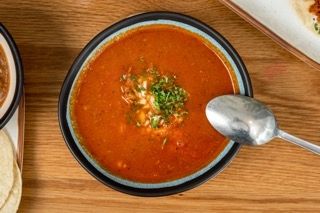Is Mexican Food Healthy And Balanced? Unpacking the Nutritional Benefits of Traditional Components
The question of whether Mexican food is healthy welcomes an exploration of its standard ingredients. Beans and corn function as fundamental staples, rich in protein and fiber. Avocados supply beneficial fats, while various herbs and flavors include flavor and health benefits - mexican food. With each other, these components create a tapestry of nutrition. The healthiness of Mexican cuisine typically depends on prep work techniques and part dimensions. What duty do these aspects play in establishing its total dietary worth?
The Power of Beans: Healthy Protein and Fiber-Rich Staples
Although usually overlooked, beans act as a foundation of Mexican food, using a riches of nutritional benefits. Rich in healthy protein, they are an exceptional plant-based option for those seeking to satisfy their dietary protein needs. This high protein web content sustains muscle mass repair work and growth, making beans indispensable for both meat-eaters and vegetarians alike. Furthermore, beans are a remarkable source of nutritional fiber, which helps in digestion and advertises a feeling of volume, potentially helping with weight management.
The selection of beans utilized in Mexican dishes, such as black beans, pinto beans, and kidney beans, adds to a diverse flavor account and can improve dishes nutritionally. In addition, beans are low in fat and contain vital nutrients, consisting of iron, folate, and magnesium. With each other, these qualities make beans an essential active ingredient, delivering both sustenance and sustenance in traditional Mexican fare.

Corn: a Versatile Grain With Nutritional Perks
Corn sticks out as a versatile grain fundamental to Mexican cuisine, commemorated not just for its cooking applications yet also for its outstanding nutritional account. As a key active ingredient in dishes like tortillas, tamales, and pozole, corn offers vital nutrients that add to a well balanced diet regimen. Rich in carbohydrates, it works as a considerable power resource, while likewise being reduced in fat, making it a positive alternative for numerous dietary needs.
Corn is a good source of nutritional fiber, which assists in food digestion and advertises satiety. It consists of considerable quantities of vitamins such as B-complex vitamins, which are necessary for basal metabolism. The existence of antioxidants, particularly carotenoids, adds to total health by decreasing oxidative tension. Additionally, corn is gluten-free, dealing with those with gluten level of sensitivities. Generally, the nutritional benefits of corn emphasize its relevance in typical Mexican food and its duty in a healthy and balanced diet.
Avocados: Healthy Fats and Nutrients in Every Bite
Avocados play a substantial function in Mexican cuisine, enhancing dishes with their luscious structure and rich taste. Beyond their cooking charm, avocados are celebrated for their impressive dietary account. They are a rich resource of healthy and balanced monounsaturated fats, which can help reduced poor cholesterol levels and assistance heart health. Additionally, avocados are loaded with vital vitamins and minerals, consisting of potassium, vitamin E, and B vitamins, contributing to total wellness.
The high fiber content in avocados help digestion and advertises satiety, making them a valuable addition to any kind of meal. Their one-of-a-kind nutrient structure can also sustain skin wellness and offer anti-inflammatory advantages. Integrating avocados right into conventional Mexican recipes or enjoying them as a standalone treat can boost both taste and nourishment, showing why they are a cherished staple in Mexican cuisine. On the whole, avocados provide a tasty way to take pleasure in healthy and balanced fats and important nutrients in every bite.

Seasonings and Natural Herbs: Flavorful Health And Wellness Boosters
While delighting in the rich tastes of Mexican cuisine, one can not ignore the essential role that spices and herbs play in enhancing both taste and health. Components such as oregano, chili, and cilantro peppers not only contribute to the dynamic flavor profile but also provide significant health advantages. Cilantro is understood for its purifying homes, assisting to eliminate hefty steels from the body, while oregano is packed with anti-oxidants and has anti-inflammatory impacts.
Chili peppers, a staple in lots of Mexican meals, consist of capsaicin, which has been connected to enhanced metabolism and discomfort alleviation. Additionally, spices like cumin and coriander assistance food digestion and might aid in blood sugar level guideline. Incorporating these flavorful wellness boosters into meals not only boosts the cooking experience but additionally promotes total wellness, making Mexican food not just delicious, yet also nutritionally useful.
Standard Cooking Techniques: Enhancing Nutrition and Taste
Traditional cooking approaches in Mexican cuisine play an essential function in enhancing both nutrition and taste, as they typically focus on time-honored strategies and fresh ingredients. Methods such as nixtamalization, where corn is saturated and cooked in an alkaline option, not only enhance the nutrient profile of tortillas however additionally enhance their digestibility - lunch and dinner. Additionally, using sluggish food preparation methods, like stewing or braising, allows tastes to fuse wonderfully while maintaining the honesty of the ingredients

Often Asked Questions
Are Mexican Food Portions Normally Larger Than Other Foods?
Mexican food parts are often larger than those of several other foods. This characteristic mirrors conventional eating practices, highlighting public sharing and hearty meals, which can bring about a more significant serving dimension generally.
Just how Does the Preparation Technique Affect Healthfulness of Mexican Food?
Preparation techniques greatly influence the healthfulness of Mexican food. Strategies such as cooking or steaming protect nutrients, while frying can boost unhealthy fat material. Options of active ingredients and cooking styles eventually establish total nutritional worth.
Can Mexican Food Be Tailored for Certain Nutritional Constraints?
Mexican food can indeed be tailored for certain nutritional constraints. Substitutions, such as using corn tortillas for gluten-free diet plans or integrating even more vegetables, allow individuals to take pleasure in typical tastes while suiting various nutritional needs.
What Prevail False Impressions Concerning Mexican Food and Wellness?
Common misconceptions concerning Mexican food consist of the idea that it is inherently undesirable, excessively zesty, and only concentrated on fats. In truth, typical recipes typically include healthy components and can be tailored to various nutritional demands.
Exist Much Healthier Choices at Mexican Restaurants?
Healthier options at Mexican dining establishments often consist of smoked meats, beans, and take out and delivery fresh vegetables. Choosing recipes that highlight whole ingredients and avoiding hefty sauces can cause a much more nutritious eating experience, advertising total health.
The range of beans used in Mexican recipes, such as black beans, pinto beans, and kidney beans, adds to a diverse taste account and can enhance dishes nutritionally. Avocados play a substantial role in Mexican food, enhancing recipes with their creamy appearance and rich flavor. Incorporating avocados right into conventional Mexican recipes or enjoying them as a standalone snack can enhance both flavor and nourishment, demonstrating why they are a precious staple in Mexican food. While delighting in the abundant tastes of Mexican cuisine, one can not overlook the crucial duty that spices and herbs play in boosting both taste and health. Typical cooking methods in Mexican cuisine play an important duty in enhancing both nourishment and flavor, as they commonly prioritize fresh active ingredients and time-honored methods.